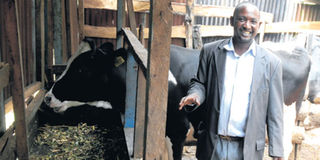Chewing over change: Miraa farmers move on to passion fruit and dairy cows

Zachary Mutisya in his dairy farm in Meru. The former miraa farmer now keeps cows after the ban opened his eyes. PHOTO | SHERIDAN GUNDERSON | NATION MEDIA GGROUP
What you need to know:
- Now they are taking matters into their own hands, educating themselves about what to grow next by surfing the net and reading the Seeds of Gold.
- Although the impacts of the ban are blatant and radical for all those growing miraa, there is a small group of farmers who are using the ban as an opportunity to diversify into other crops and learn new skills to confront a future of fractured miraa markets
- After an evening of examining Imarika Orients’ ongoing projects, Mugambi, Mutembei, and I pick a handful of miraa to take to their chewing session.
June 24, 2014 is a date seared in the memory of residents in the Nyambene Hills. It was on this day that Britain placed a ban on miraa, a cash crop grown by almost every farmer in the region. Even those who do not grow the crop have been hit hard with the economic impacts of the ban.
As I pass through towns in the Nyambene Hills; Maua, Athiru Gaiti, Kiraone, Kalinki and Gikongo, small clusters of people are gathered around constellations of neon green piles in the ochre dirt, remnants of leaves stripped from miraa taken to markets with fewer buyers. A quick scan of the streets shows signs of the ban. Markets once brimming with trade are empty, businesses are closed, and cafés are deserted.
Many farmers tell me they are hopeful the ban will be lifted; that they will be patient and weather the storm because they do not have the means or expertise to farm anything else.
In a meeting with Peter Gatubo, a sub county agricultural officer for Igembe South, I suggest miraa farmers might be resisting crop diversification because the soil may not be suitable for other crops. He assures me, “It is not an issue of soil; it’s attitude”.
Although the impacts of the ban are blatant and radical for all those growing miraa, there is a small group of farmers who are using the ban as an opportunity to diversify into other crops and learn new skills to confront a future of fractured miraa markets. The attitude highlighted by Gatubo certainly does not apply.
The group is called Imarika Orients, the etymology highlighting the positive change and improvements they seek with their projects. The name itself embodies the sense of hope for progress amongst the group members.
TURNING POINT
The group was founded August 9, last year, nearly a month after the ban went into effect. The chair, Robert Mugambi, says the name of the group indicates, “the turning point from miraa to something else ... the changing of direction ... we don’t have the political ability so this is how we’re changing our future.”
There is a registration fee as well as another small fee to help pay for establishing community farms, seedlings, fencing and farm maintenance.
One of the five founders, Alex Mutembei, says they used to spend evenings at their friend’s place chewing miraa. It was these chewing sessions after the ban that led to the founding of the group, which now has 30 members and a total of four hectares (almost 10 acres) of shared land where they grow a variety of fruits, vegetables, and raise chickens.
Last season, despite the dry spell, they were able to make Sh50,000 from their watermelon crop. The group is keen to set an example for others in the community to take the same initiative, and is known primarily for turning to farming passion fruit since the ban. In fact, members host visitors on their farms daily to show them their projects and educate them on how to diversify their own farms.
NUTRITIONAL VALUE
Before the ban, members of Imarika Orients were completely focused on miraa. Now they are taking matters into their own hands, educating themselves about what to grow next by surfing the net and reading the Seeds of Gold.
As we walk through Mugambi’s farm, both he and Mutembei bombard me with facts about the nutritional values of guava and passion fruit. Everything they grow, including the raising of chickens, is done organically. Mugambi’s wife fries me an egg laid by one of their chickens to prove its superior quality.
The group has ambitious plans, including having a dairy farm where they hope to produce yoghurt, cheese, and butter. Mugambi says, “We can export our products just like we did miraa.”
Another founder, Zachary Mutisya, is eager to tell me about his own project with dairy cows. They require a lot of capital upfront, but he is confident that once they calve, the returns will be well worth the investment.
Many members are donating their land to the group so that they can start new projects. So far their main project has been that of growing passion fruits. They plan to use the profits from the fruit to buy more land and start new projects.
The founders insist they are motivated by innovation. Thus, they are not interested in repeating projects done by many people in the past. They are eager to try their hand on rabbit farming.
After an evening of examining Imarika Orients’ ongoing projects, Mugambi, Mutembei, and I pick a handful of miraa to take to their chewing session. As we arrive, I notice many other members of the group gathered there already, no doubt to discuss current and future farming projects.




